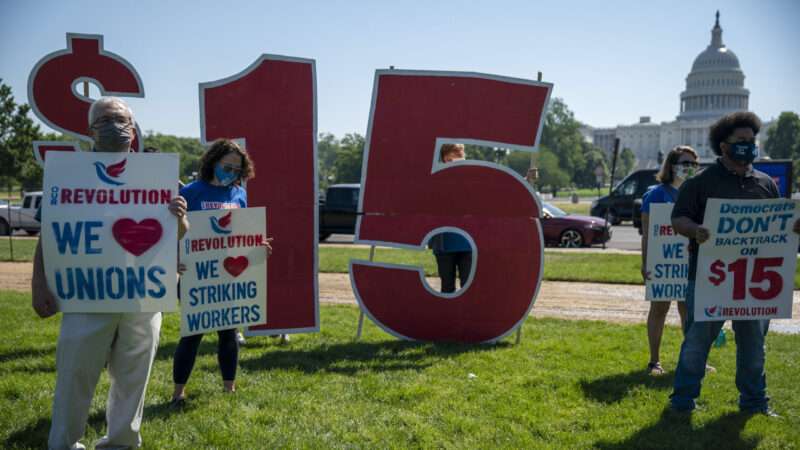
Despite telling pollsters that rising prices are a top concern, voters in Tuesday's midterm election seem to have approved all three proposed minimum wage increases—policies that will likely force businesses in some places to raise prices.
The broadest minimum wage increase on the ballot was in Nebraska, where voters approved a hike from $9 per hour to $15 per hour. With all precincts reporting on Wednesday, the measure passed with more than 58 percent of the vote.
As a result, the minimum wage in the Cornhusker State will increase by $1.50 annually until it reaches $15 per hour in 2026. After that, the state's minimum wage will be tied to inflation and will continue to rise with the consumer price index.
Business groups like the Nebraska Grocery Industry Association have warned that the planned increase in minimum wages will require further price increases for goods and services. That's coming on the heels of decades-high inflation rates that have caused food prices to rise by more than 11 percent in the past year—something voters told exit pollsters on Tuesday was a top concern.
In Washington, D.C., an even more aggressive minimum wage increase was approved by more than 74 percent of voters—four years after D.C. City Council blocked a similar plan.
The so-called "tipped minimum wage" ballot question will increase hourly pay for waiters, bartenders, and other tipped workers from $5.35 per hour to $16.10 per hour by 2027. That means workers who earn tips will have to be paid the same amount as other employees who do not earn tips.
As Reason has previously reported, that's not as good of a deal for workers as it might sound. Tipped workers can earn far more than $16 per hour and D.C. law requires that employers make up the difference if workers fall short of the hourly minimum wage during their shifts. Eliminating the tipped minimum wage means customers will likely tip less, which means tipped workers might end up actually earning less despite the minimum wage increase.
In New York, a recent tipped minimum wage hike caused many bars and restaurants to cut hours and reduce staff, according to a survey from the New York City Hospitality Alliance. Workers who merely saw their hours cut might have been lucky. As Reason's Billy Binion reported in 2019, two researchers at Harvard Business School found that the average restaurant has an additional 14 percent chance of closing for every dollar added to the tipped minimum wage.
Unions and other left-leaning political groups have successfully pushed minimum wage hikes in states and localities in recent years, usually by ignoring the obvious trade-offs of these policies. In 2021, the Congressional Budget Office calculated that a national minimum wage of $15 per hour would cost 1.4 million jobs, even as the higher pay for those who remained employed would lift 0.9 million people out of poverty.
The final minimum wage question to appear on midterm election ballots was in Nevada, where voters were asked if they wanted to amend the state constitution to hike the minimum wage to $12 per hour but also remove a previously approved measure tying future minimum wage hikes to inflation. It would also eliminate a provision of the state's minimum wage law allowing employers to pay $1 less per hour if they offer health insurance to their employees.
That's a complicated question—probably not well suited to a ballot initiative—but it appears to be headed for approval. With some precincts still unreported on Wednesday afternoon, 54 percent of voters have signaled their support.
As in D.C., where voters and the city council have been going back and forth over the tipped minimum wage increase for several years, Nevada's vote on Tuesday represents a quick reversal of a recent decision. In 2019, state lawmakers voted to tie the minimum wage to inflation. Now, that could be undone.
And with prices still rising at unacceptably high rates and driving wages higher everywhere, Tuesday's election is surely not the final word in the debate over how much workers should be paid per hour.
Maybe we should try letting employees and employers figure out the answer without getting state lawmakers and voters involved.
The post Worries About Inflation Didn't Stop Voters From Approving Minimum Wage Increases appeared first on Reason.com.







